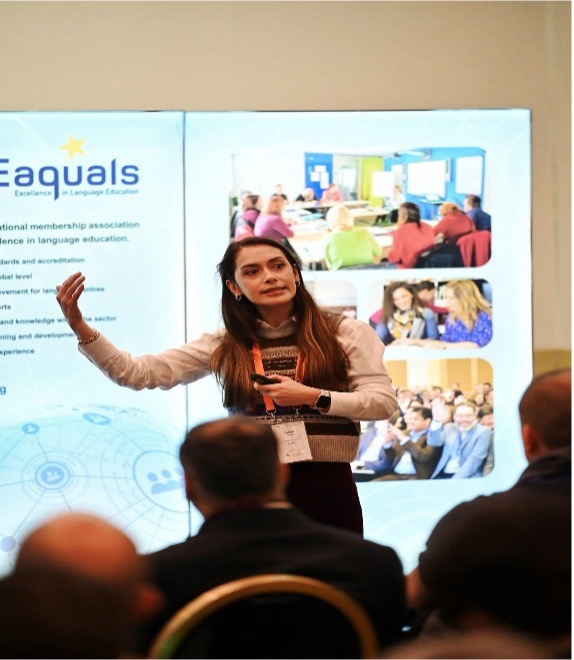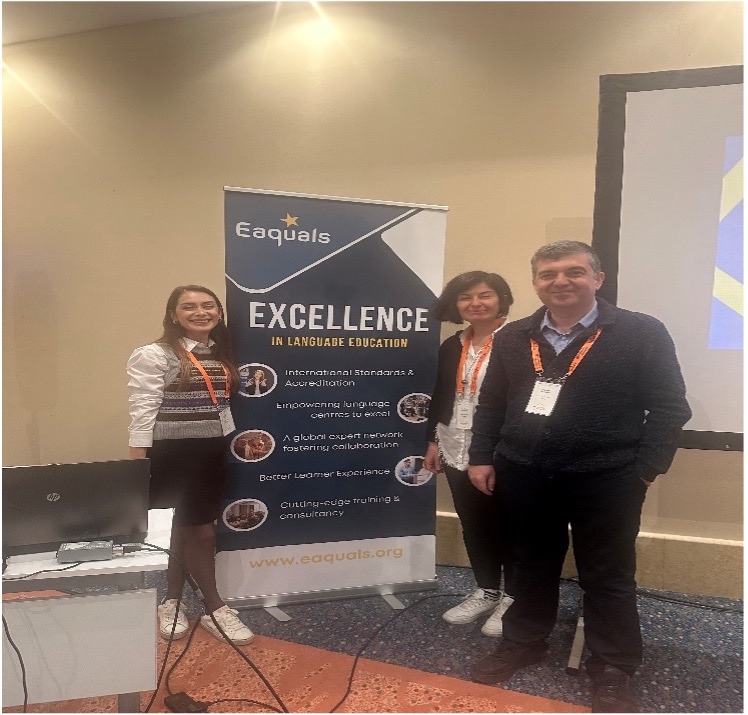Eaquals International Conference 2025 Malta
Eaquals International Conference 2025, Malta
by Özlem Zengin

Recently, I had a chance to attend and present at the Eaquals International Conference 2025, which was held in Malta, 26th-28th March, 2025. Attending the Eaquals International Conference 2025 was a deeply enriching experience, both professionally and personally. The sessions I attended not only expanded my understanding of key issues in ELT today, but also inspired me to think more critically about the future of our profession and the practical steps we can take to keep evolving as educators and institutions. It also provided some tangible ideas that I can bring back to my institution.
I had the opportunity to contribute to this exciting atmosphere by delivering my own session titled AI in the Language Classroom: Transforming Teaching, Empowering Learning. In my presentation, I explored how AI is reshaping English language teaching by enhancing teacher productivity, supporting learner autonomy, and fostering digital literacy. I demonstrated practical ways to integrate AI tools into the classroom, from platforms that personalize reading experiences and vocabulary learning to tools that offer instant feedback and gamify the language learning journey. I also highlighted key ethical considerations such as data privacy and responsible AI use. It was rewarding to engage with fellow educators around these themes and share ideas on how we can collectively reimagine our roles and methodologies in the age of AI.

Below are my reflections on some of the sessions that resonated with me the most.
One of the most thought-provoking sessions was Zarina Subhan’s plenary on Diversity, Equity and Inclusion in ELT. What really resonated with me was her emphasis on DEI not as a checklist but as a mindset that should be woven into the learning experience itself. She reminded us that fostering inclusive environments isn’t just the ethical thing to do—it’s essential for meaningful learning in multilingual, multicultural classrooms where English is increasingly a lingua franca. Her talk made me reflect on my own classroom practices and how I might help my students engage with difference more respectfully and authentically through language.

Another highlight was the session by Neslihan and Sonat Demirdirek, Winds of Change: Adapting Teaching Objectives for an AI-Driven Future. Their research-based insights into how students are already using AI tools like ChatGPT in university contexts really struck a chord. I found their decision to shift writing assessments to in-class formats to maintain academic integrity both practical and forward-thinking. Their balanced approach—acknowledging the usefulness of AI while also recognizing its potential to challenge existing practices—was especially relevant to my own interest in integrating AI tools into ELT in responsible and effective ways.
Digital Leadership for Schools by Koray Tunç was another powerful session, especially in terms of strategic vision. He offered a clear roadmap for developing digital leadership across all levels of a school, starting with management. What stood out to me was the idea of transforming school culture to prioritize adaptability and lifelong learning, not just in students, but in teachers and leaders alike. His session gave me a lot to think about regarding institutional change and the role of AI in shaping how we lead and learn.
The session titled The Use of AI in Grading English Language Learners' Speaking Skills was also fascinating. While I’ve been exploring AI tools for formative assessment, this session pushed me to consider their potential in summative contexts as well. The comparison between AI and human raters in speaking assessments raised important questions about fairness, reliability, and teacher workload. It’s encouraging to see AI being tested not just as a novelty but as a potentially valid partner in the assessment process, especially when transparency and clear criteria are in place.
On the more creative and experiential side, The Red Carpet Language Learning Experience by Ian Brangan offered an inspiring perspective on student-centered school experiences. His emphasis on celebrating learners, personalizing educational journeys, and embracing the emotional side of language learning reminded me of the importance of joy and recognition in education. I left that session feeling energized to think about how I can help create more memorable and meaningful experiences for my students.
Project-based learning has always been an interest of mine, so I was excited to attend Language with Purpose, which highlighted how digital storytelling and global citizenship can be integrated into language education. The session showcased powerful examples of students engaging with real-world issues and using their language skills in impactful ways. It reinforced my belief that digital literacy and global competence should be core goals in today’s ELT classroom, not just nice-to-have extras.
Finally, I found Robin A. Kossef’s workshop on Task-based Learning in a Flipped Classroom particularly practical and hands-on. The focus on backward lesson design and maximizing the group learning space in class aligned well with my own interest in increasing student autonomy and peer collaboration. I appreciated the emphasis on using feedback—both teacher and peer—as a driver for deeper learning. It was a great reminder of how we can design tasks that challenge and engage learners in meaningful production beyond surface-level activities.
In sum, the conference offered a powerful blend of theoretical depth, practical strategies, and visionary thinking. From DEI to AI, from digital leadership to transformative learning experiences, each session left me with new insights, questions, and ideas to try out in my own context. I’m leaving Malta not just with notes and resources, but with a renewed sense of purpose and direction for the road ahead.
